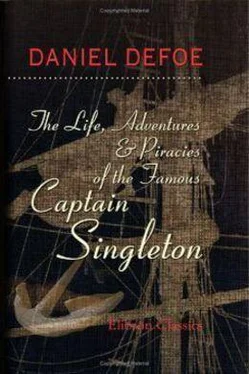William was so uneasy at losing this opportunity, that he pressed us earnestly to go up to Japan to find out these men. He told us that if it was nothing but to recover thirteen honest poor men from a kind of captivity, which they would otherwise never be redeemed from, and where, perhaps, they might, some time or other, be murdered by the barbarous people, in defence of their idolatry, it were very well worth our while, and it would be, in some measure, making amends for the mischiefs we had done in the world; but we, that had no concern upon us for the mischiefs we had done, had much less about any satisfactions to be made for it, so he found that kind of discourse would weigh very little with us. Then he pressed us very earnestly to let him have the sloop to go by himself, and I told him I would not oppose it; but when he came to the sloop none of the men would go with him; for the case was plain, they had all a share in the cargo of the great ship, as well as in thae of the sloop, and the richness of the cargo was such that they would not leave it by any means; so poor William, much to his mortification, was obliged to give it over. What became of those thirteen men, or whether they are not there still, I can give no account of.
We are now at the end of our cruise; what we had taken was indeed so considerable, that it was not only enough to satisfy the most covetous and the most ambitious minds in the world, but it did indeed satisfy us, and our men declared they did not desire any more. The next motion, therefore, was about going back, and the way by which we should perform the voyage, so as not to be attacked by the Dutch in the Straits of Sunda.
We had pretty well stored ourselves here with provisions, and it being now near the return of the monsoons, we resolved to stand away to the southward; and not only to keep without the Philippine Islands, that is to say, to the eastward of them, but to keep on to the southward, and see if we could not leave not only the Moluccas, or Spice Islands, behind us, but even Nova Guinea and Nova Hollandia also; and so getting into the variable winds, to the south of the tropic of Capricorn, steer away to the west, over the great Indian Ocean.
This was indeed at first a monstrous voyage in its appearance, and the want of provisions threatened us. William told us in so many words, that it was impossible we could carry provisions enough to subsist us for such a voyage, and especially fresh water; and that, as there would be no land for us to touch at where we could get any supply, it was a madness to undertake it.
But I undertook to remedy this evil, and therefore desired them not to be uneasy at that, for I knew that we might supply ourselves at Mindanao, the most southerly island of the Philippines.
Accordingly, we set sail, having taken all the provisions here that we could get, the 28th of September, the wind veering a little at first from the N.N.W. to the N.E. by E., but afterwards settled about the N.E. and the E.N.E. We were nine weeks in this voyage, having met with several interruptions by the weather, and put in under the lee of a small island in the latitude of 16 degrees 12 minutes, of which we never knew the name, none of our charts having given any account of it: I say, we put in here by reason of a strange tornado or hurricane, which brought us into a great deal of danger. Here we rode about sixteen days, the winds being very tempestuous and the weather uncertain. However, we got some provisions on shore, such as plants and roots, and a few hogs. We believed there were inhabitants on the island, but we saw none of them.
From hence, the weather settling again, we went on and came to the southernmost part of Mindanao, where we took in fresh water and some cows, but the climate was so hot that we did not attempt to salt up any more than so as to keep a fortnight or three weeks; and away we stood southward, crossing the line, and, leaving Gillolo on the starboard side, we coasted the country they call New Guinea, where, in the latitude of eight degrees south, we put in again for provisions and water, and where we found inhabitants; but they fled from us, and were altogether inconversable. From thence, sailing still southward, we left all behind us that any of our charts and maps took any notice of, and went on till we came to the latitude of seventeen degrees, the wind continuing still north–east.
Here we made land to the westward, which, when we had kept in sight for three days, coasting along the shore for the distance of about four leagues, we began to fear we should find no outlet west, and so should be obliged to go back again, and put in among the Moluccas at last; but at length we found the land break off, and go trending away to the west sea, seeming to be all open to the south and south–west, and a great sea came rolling out of the south, which gave us to understand that there was no land for a great way.
In a word, we kept on our course to the south, a little westerly, till we passed the south tropic, where we found the winds variable; and now we stood away fair west, and held it out for about twenty days, when we discovered land right ahead, and on our larboard bow; we made directly to the shore, being willing to take all advantages now for supplying ourselves with fresh provisions and water, knowing we were now entering on that vast unknown Indian Ocean, perhaps the greatest sea on the globe, having, with very little interruption of islands, a continued sea quite round the globe.
We found a good road here, and some people on shore; but when we landed, they fled up the country, nor would they hold any correspondence with us, nor come near us, but shot at us several times with arrows as long as lances. We set up white flags for a truce, but they either did not or would not understand it; on the contrary, they shot our flag of truce through several times with their arrows, so that, in a word, we never came near any of them.
We found good water here, though it was something difficult to get at it, but for living creatures we could see none; for the people, if they had any cattle, drove them all away, and showed us nothing but themselves, and that sometimes in a threatening posture, and in number so great, that made us suppose the island to be greater than we first imagined. It is true, they would not come near enough for us to engage with them, at least not openly; but they came near enough for us to see them, and, by the help of our glasses, to see that they were clothed and armed, but their clothes were only about their lower and middle parts; that they had long lances, half pikes, in their hands, besides bows and arrows; that they had great high things on their heads, made, as we believed, of feathers, and which looked something like our grenadiers' caps in England.
When we saw them so shy that they would not come near us, our men began to range over the island, if it was such (for we never surrounded it), to search for cattle, and for any of the Indian plantations, for fruits or plants; but they soon found, to their cost, that they were to use more caution than that came to, and that they were to discover perfectly every bush and every tree before they ventured abroad in the country; for about fourteen of our men going farther than the rest, into a part of the country which seemed to be planted, as they thought, for it did but seem so, only I think it was overgrown with canes, such as we make our cane chairs with—I say, venturing too far, they were suddenly attacked with a shower of arrows from almost every side of them, as they thought, out of the tops of the trees.
They had nothing to do but to fly for it, which, however, they could not resolve on, till five of them were wounded; nor had they escaped so, if one of them had not been so much wiser or thoughtfuller than the rest, as to consider, that though they could not see the enemy, so as to shoot at them, yet perhaps the noise of their shot might terrify them, and that they should rather fire at a venture. Accordingly, ten of them faced about, and fired at random anywhere among the canes.
Читать дальше












